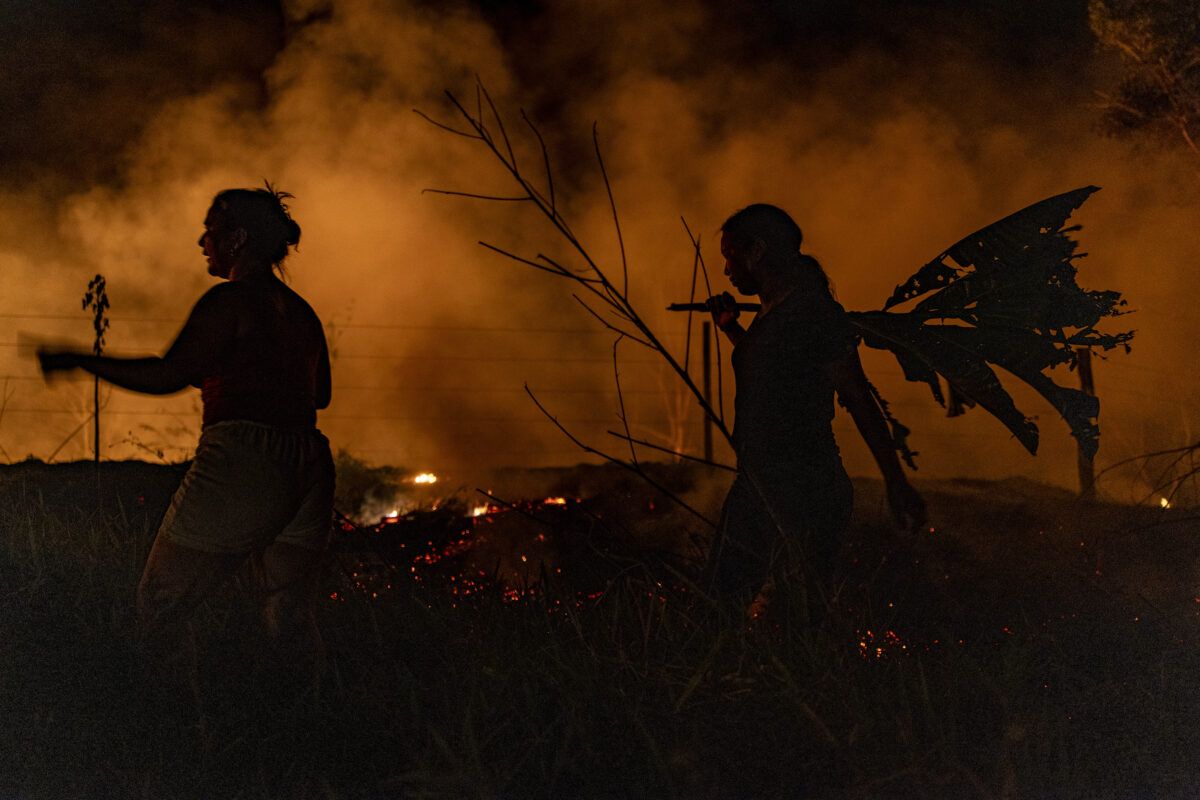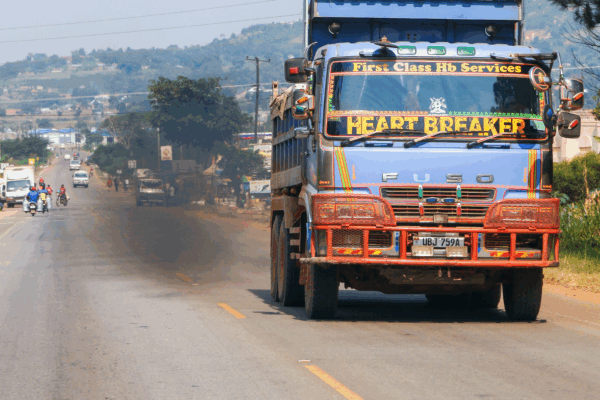Countries made a first-of-its-kind announcement to tackle major sources of black carbon emissions on the sidelines of COP30 in Belém, Brazil on Wednesday. Ministers and senior officials from Canada, Chile, Colombia, Costa Rica, Dominican Republic, Madagascar, Nigeria, Sri Lanka and Uganda revealed national policies and sectoral actions to advance action on black carbon. Actions range from integrating black carbon into climate strategies to targeted interventions in the electricity, transportation, and oil and gas sectors.
Also known as ‘soot’, black carbon is one of the super pollutants alongside methane that are responsible for half of global warming. The super pollutant also degrades air quality and harms human health, especially in low- and middle-income countries. Targeted action on black carbon and tropospheric ozone could mitigate an estimated 0.14°C by 2050.
From super pollutant to solution
Black carbon’s impact goes beyond climate change – it pollutes the air in our communities and coats our lungs, contributing to millions of premature deaths and billions of economic costs from air pollution each year.
The super pollutant is also smothering the ecosystems that are vital to human and planetary life. Its particles in the air absorb the sun’s warmth, heating our climate and disrupting local weather patterns. And when those particles settle on snow and ice, they darken the surface and accelerate the melting of glaciers and sea ice.
It’s a global problem that is felt very close to home. Countries around the world are suffering from worsening air quality and extreme heat, both of which are driven by black carbon, with devastating consequences. Cutting black carbon and other super pollutants like methane and tropospheric ozone is our emergency brake on climate change.
Despite the distinct climate and health impacts of these emissions, black carbon has remained largely absent from the global climate agenda. Only US$824 million of development finance, less than 0.5% of total funding, went to projects tackling major sources of black carbon in 2023, according to our latest research.
Countries step forward to protect people and planet
The announcement highlights countries’ leadership to effectively deliver climate, air quality and health benefits. The actions announced include:
- Canada shared a Climate Competitiveness Strategy with actions that will reduce black carbon from electricity, transport and oil and gas sectors. They mentioned the importance of capturing black carbon’s unique climate forcing on snow and ice.
- Chile highlighted their 25% black carbon emissions reduction target by 2030, from 2016 levels, in their Nationally Determined Contributions (NDC), with additional sectoral actions on household energy and vehicle standards. The minister highlighted how a focus on black carbon has supported integration of climate and air quality policy and regulation.
- Colombia reaffirmed its commitment to reduce black carbon emissions by 40% by 2030 (compared to 2014) in their new NDC, and to cut a further 6,130–8,873 tonnes by 2035 compared to 2014 levels. They highlighted priority sectors for action as transport, agriculture-related fires, industry, construction and energy, noting the health, air quality and climate impacts of black carbon.
- Costa Rica’s updated NDC prioritises deep mitigation in the transport and energy sectors. Concrete measures to reduce emissions in black carbon-rich sectors include investment in public transport, deployment of electric passenger trains and scaling up charging infrastructure.
- Dominican Republic put a spotlight on the importance of measuring black carbon, which is informing national planning and implementation in energy, transport, agriculture and waste sectors. They expressed excitement on working with this peer network of countries to scale up ambition on black carbon.
- Nigeria has developed a new policy on clean cooking that will significantly cut black carbon emissions and look to increase implementation through the CCAC Super Pollutant Country Action Accelerator.
- Madagascar announced a suite of plans on black carbon, including integration of black carbon into their NDC and the development of a national mitigation strategy. This includes reducing open burning, increasing the dissemination of cookstoves and strengthening emissions standards for vehicles and small industries.
- Sri Lanka announced their new climate prosperity plan which includes black carbon and their new NDC which includes actions that will reduce black carbon, including an air pollution-related health action plan and a vehicle emissions testing programme. They called for support and cooperation towards a common vision of greater ambition on black carbon.
- Uganda announced a forthcoming National Black Carbon Action Plan, which will include targeted mitigation measures across high-emitting sectors and will be integrated into the country’s national climate plans.
Acting on black carbon is one of the fastest ways to protect health, improve equity, and support our climate goals, especially when we target the sectors that matter most… Chile’s updated Nationally Determined Contribution (2025–2035) emphasises action on short-lived climate forcers and commits to reducing black carbon emissions by at least 25% by 2030 and at least 30% by 2035 compared to 2016 levels, recognising the joint climate, clean-air, and health benefits of rapid reductions.
H.E. Dr. Maisa Rojas, Minister for the Environment, Republic of Chile
The Honourable Julie Dabrusin, Minister of Environment and Climate Change, Canada.
Our recently released Climate Competitiveness Strategy to build Canada strong includes actions that will reduce black carbon and other short-lived climate pollutants from major sources in the electricity, transportation, and oil and gas sectors. We look forward to participating in this important initiative that aims to drive scalable, high-impact black carbon reductions to protect the air we breathe, human health and the environment.
Dr. Alfred Okot Okidi, Permanent Secretary, Ministry of Water and Environment, Uganda
Uganda is taking bold and deliberate steps to confront the growing threat of black carbon, a pollutant that endangers both our people and our climate. The development of our National Black Carbon Action Plan marks a significant milestone in safeguarding public health and advancing our national climate commitments. I invite our partners to collaborate with us by offering the financial, technical, and capacity-building assistance required to translate this plan into tangible, measurable outcomes.
Cutting super pollutants like black carbon and methane is one of the fastest and most effective ways to slow global warming and clean our air. Decisive action could prevent hundreds of thousands of deaths every year and bolster economies. The United Kingdom is proud to support programmes to reduce black carbon and improve air quality around the world. I welcome this step forward at COP30.
Rachel Kyte, UK Special Representative for Climate. The UK Co-chairs the Climate and Clean Air Coalition.
Jane Burston, CEO of Clean Air Fund
Tackling black carbon is a missing piece of the climate puzzle, delivering benefits almost immediately. Yet despite its impact on our health and on near-term warming, action has been largely absent from the global climate agenda. We applaud this leading group of countries for stepping up to change that. By announcing actions to cut black carbon and other super pollutants, they are seizing an opportunity to speed up climate progress, improve people’s health and strengthen local economies.
Representatives from the Asian Development Bank and the African Development Bank also welcomed the announcements.
The announcement marks an important step toward strengthened policies, expanded cooperation, and increased international support for reducing black carbon emissions. Participating countries committed to collaborate through a peer network, including technical exchange, shared learning, and joint advocacy.
The Clean Air Fund will provide support to the peer network going forward including action-focused dialogues. The Climate and Clean Air Coalition, working closely with Clean Air Fund, SLYCAN Trust and other partners, will support participating countries through links with the CCAC sectoral Hubs and the CCAC Super Pollutant Country Action Accelerator.
We’re accelerating action on black carbon
Clean Air Fund’s black carbon programme aims to see countries slash emissions by 35% below 2010 levels by 2030 and achieve climate mitigation consistent with limiting global warming to 1.5˚C. We will soon be launching our Black Carbon Hub, a one stop shop for the latest resources, evidence, efforts and news related to black carbon. Sign up here for updates


